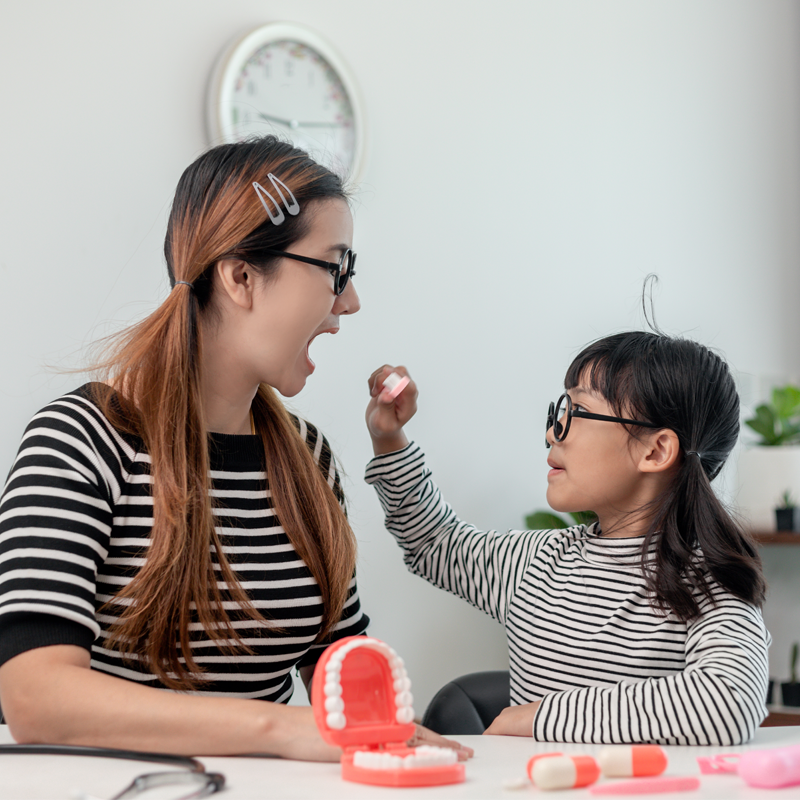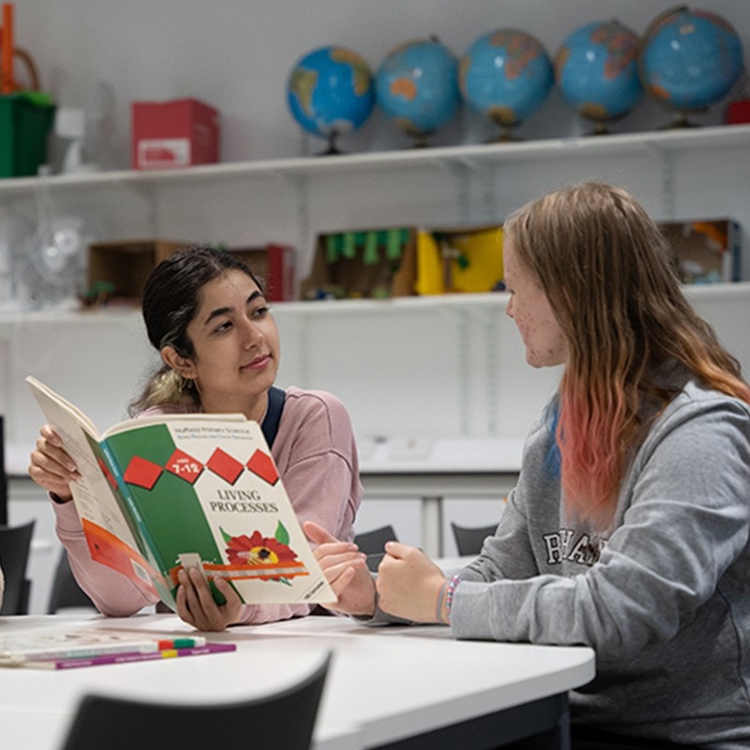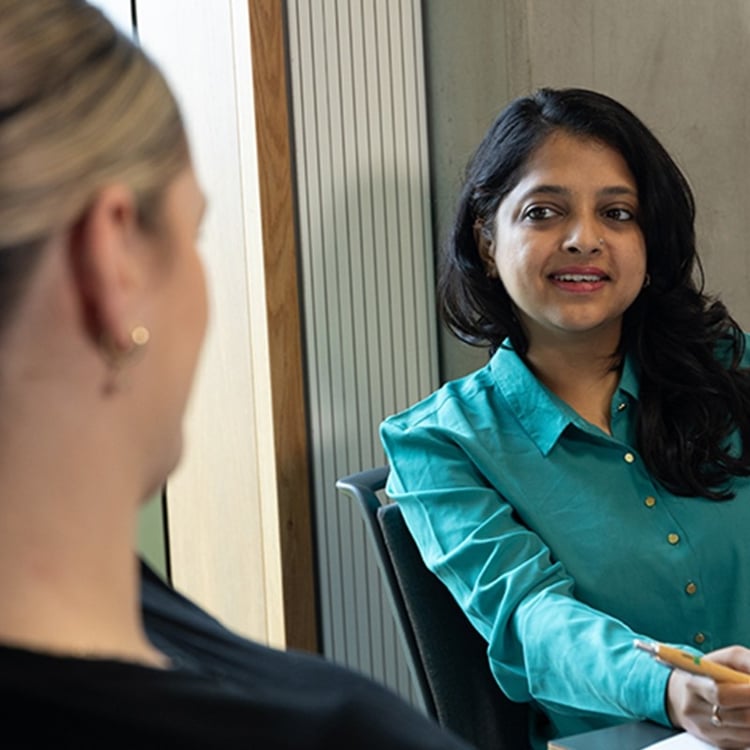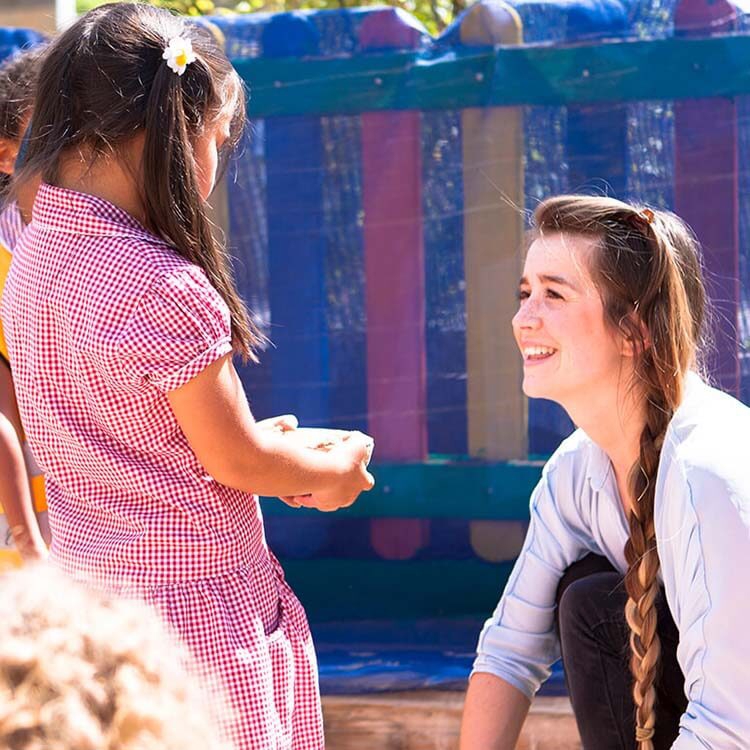Entry tariff:
112–128 UCAS points (or equivalent)
Foundation Year: 64–80 UCAS points (or equivalent)
International Foundation Pathway:
64 UCAS (or equivalent)
IELTS: 5.5
UCAS code:
B620
Start date(s):
September 2026
Develop the knowledge and skills to work with people with a range of communication and swallowing disorders for a rewarding career as a Speech and Language Therapist in healthcare or education settings.
Did you know
This course is accredited and approved by Royal College of Speech and Language Therapy (RCSLT) and Health Care Professions Council (HCPC) This means that successful graduates will be eligible to be registered professionals with the HCPC and work as an autonomous Speech and Language Therapist.
You may be eligible to apply for a £5000 NHS bursary.
Top 3 modern university in London
(Complete University Guide 2025)

Ranked in the top 15% in the world
Times Higher Education Young University Rankings 2024

#8 in England for undergraduate student satisfaction
National Student Survey 2024

Modules
This is a new course for September 2025.
Module overview: This module is an introductory module on the Speech and Language Therapy programme and allows learners an opportunity to understand the professional and regulatory aspects of the role of a Speech and Language Therapist. This module has been designed with underpinning principles of professionalism and working in collaboration as a foundational aspect of the programme. There is an opportunity to apply the theoretical knowledge and use newly acquired reflective frameworks to consider their own skills and functioning in this area. These skills will support their practice placement learning and support the development of their own professional identity as the programme develops.
How you'll learn: You will engage in lectures and seminars to cover core content, while regular asynchronous learning will give you the flexibility to access materials in your own time. As this is one of your first modules in the first year, these structured opportunities will help you settle into your learning journey.
Lecture content will be provided as videos on Moodle, and you’ll receive supporting resources and materials 48 hours before each session. This gives you the chance to prepare and pre-learn, especially if you prefer to review content in advance. Tutorials will allow you to explore your developing knowledge and apply theory in a supportive environment.
Module overview: This module has been designed to support learners to have clear detailed understanding of the communication process as a whole, and the constituent parts, which are the building blocks. Typical development of Speech and Language skills will be taught with milestones across the lifespan, discussing different theories of language acquisition and highlighting the importance of considering development as a whole.
Linguistics and phonetics will be taught and practical workshop sessions will allow students to develop foundational skills in phonetic transcription and linguistic analysis, with English sounds.
Material around sound, audiology, hearing and deaf society and culture will be explored in theoretical and practical workshop sessions. Pragmatics of language will be explored considering use and meaning in context and this will lead to consideration of communication at conversation level.
Anatomy and physiology will be taught with detailed application to speech and language development in infancy and childhood including craniofacial disorders and cleft lip and palate.
How You’ll Learn: In this module, you’ll focus on developing practical skills in phonetic transcription and linguistic analysis. You’ll work with speech sound and language sample resources in workshops, and when specialist equipment is needed, you’ll have access to the sound lab and other suitable environments.
You’ll learn through a mix of lectures, seminars, and workshops. Some elements, such as phonetics and hearing, will be taught in smaller groups so you can practise in more detail. You’ll also be given online and digital resources to support your independent study, alongside asynchronous learning, which is especially useful as this is one of your first-year modules.
Your learning will be supported with formative assessments such as class-based tests, quizzes, and group transcription practice in workshops. You’ll also complete computer-based multiple-choice tests to check your knowledge of anatomy and physiology, and short-answer tasks to apply your understanding of phonetics and phonology (e.g. airstream mechanisms, syllable structures, and how to describe vowels and consonants).
You’ll have a workbook to guide your activities and support continuous practice, helping you build skills step by step throughout the module.
Module overview: Eating and drinking and swallowing assessment and management is a core aspect of the professional role of a Speech and Language Therapist. This module is an introduction to the anatomy, physiology, structure and functional aspects of these skills which will be broken down into smaller constituent parts at the beginning of the module, and considered as a whole towards the end of the module. The wider systems and contexts within which eating, drinking and swallowing takes place within will be considered and the impact of these on function will be explored.
This module has been designed to introduce the anatomy and physiology necessary for eating, drinking, swallowing and saliva management. Typical and atypical development of swallowing function will be taught with case examples across the lifespan including in infancy with sucking and swallowing skills development, eating and drinking and swallowing skills in childhood, adolescence, adulthood and in older age. The focus of this module will be on the usual/typical and this will be built on with spiral curriculum principles in later modules such as ‘Assessment and management of dysphagia and voice disorders’ in year two and ‘Therapeutic and functional management skills’ in year three.
The health and well-being and health promotion aspects will be explored, appreciating the importance of nutrition in overall development, health and well-being. Holistic views of eating and drinking including psychosocial and cultural aspects will be highlighted as well as discussion of person-centered care including sensory preferences. Understanding of dental and ear, nose and throat (ENT) structures will be applied to functional skills of saliva management and the role of orthodontics. Possible co-morbidities and terminology will be introduced, and this will be further developed in year two and three modules.There will be frequent opportunities to engage in experiential and simulated practice to support the start of competency completion the RCSLT EDS competencies and this forms part of the assessment for the module. It is anticipated that the learning from this module will be developed within practice placements in year one.
How you'll learn: In this module, you’ll take part in simulation workshops to explore the stages of swallowing and what is considered typical. You’ll also have opportunities to observe and assess real people’s eating, drinking, and swallowing functions, giving you practical experience alongside your theoretical learning. A person-centred, holistic approach will guide your learning, helping you to understand that swallowing does not happen in isolation but within wider social and cultural contexts. You’ll apply this understanding further through case study assessments.
You’ll learn through a range of methods designed to build your knowledge and skills over time, including:
- Lectures (with videos available on Moodle)
- Seminars to explore and apply your developing knowledge
- Observation and peer learning
- Case-based learning and experiential workshops
- Independent study and guided reading
- Asynchronous digital learning to strengthen your observation and practical skills
Module overview: Speech and Language Therapists are professionals who work in partnerships clients and family members and with multiple other professionals across different sectors. Exploration around the nature of these relationships will support the learners as they develop a professional identity.
The importance of these relationships will be taught during this module and appreciation given to skills needed for effective relationships to be sustained. Consideration of the impact that Speech and Language Therapists can make will be explored and learners will have an opportunity to consider some of the underpinning theories which relate to this area of practice.
This module will involve developing understanding about the importance of forming and sustaining meaningful professional relationships with service users and carers, and working within a multidisciplinary team. This will build on principles of professionalism and person-centered holistic care that were introduced in ’Foundations for Professional Practice´ as part of the spiral curriculum principles of curriculum design. Developing the reflective skills of the learning further will support awareness of potential bias and barriers to developing successful professional relationships.
Exploring the role of Speech and Language Therapy in a wide range of sectors will support learners to understand the diversity of practice settings, inviting in visiting lecturers from different sectors and people with lived experience will open opportunities to hear different voices and experiences. This will help to support the transition into practice placement.
How you'll learn: You’ll experience a wide range of teaching and learning methods to help you develop both your knowledge and professional skills. Some learning outcomes will take time, discussion, and reflection to achieve—especially as you explore new settings, hear from service users and carers, and learn to integrate these perspectives into your practice.
You will:
- Access lectures through videos on Moodle, with resources available 48 hours in advance so you can prepare if you prefer pre-learning.
- Take part in tutorials to apply theory and explore your developing knowledge and skills.
- Engage with asynchronous learning, which supports flexible study and helps you settle into one of your first-year modules.
- Work in formative assessment workshops, where you’ll get feedback, feedforward, and peer support to prepare for your summative assessments.
In workshops, you’ll work in small groups to discuss lived experiences and perspectives, applying this learning to practice. Topics such as bias, psychological functioning, and health promotion will come to life through discussion and reflection, with opportunities to link theory to your longitudinal placements or university-based clinics. These activities are designed to strengthen your collaboration skills and your ability to support peers.
Module overview: This module is in the first year of the Speech and Language Therapy programme and is the learner’s first introduction to practice learning across different settings. This year long module will combine teaching and preparation in a University setting, simulation environments and practice placement in local NHS, local authority education or charitable, private and voluntary settings.
The University based learning elements will introduce learners to some of the key professional skills for practice including preparation of self, understanding of expectations. Communication skills such as introducing self, role and what service users should expect will be taught and practiced. Professional skills, observation skills and emerging skills around typical development will be built on from modules including ‘Foundations of professional practice’, ‘Communication process and building blocks’, ‘Development of eating and drinking a swallowing across the lifespan’ and ‘Working in partnership 1’.
The focus of this module will be to introduce learners to practice learning and the knowledge and skills needed for safe and effective person-centered care.
How you'll learn: You will do most of your learning for this module during your practice placements (observation, block, and longitudinal). In these settings, you’ll meet service users and professionals while being fully supported by practice educators, in line with RCSLT Practice-Based Learning guidance. You’ll always be supernumerary, meaning your role is to learn, not to replace staff.
Before going on placement, you’ll complete a preparation for practice programme. This will include simulation centre sessions, eLearning (including eLFH and clinicalskills.net), peer support, and practice with observation, assessment, and documentation. Case examples and reflective activities will help you build confidence and develop your self-reflection skills, which are a key learning outcome.
Module overview: This module sits in the second year of the programme and supports the learners to develop skills in assessment and working with people. This module builds on the introductory concepts of holistic practice and person-centered care which learners have completed in year 1 ‘Working in Partnership’ and develops this as part of a spiral curriculum, with a focus on assessment skills which is applied to Communication and swallowing conditions in people who have complex presentations and a need for a holistic and person-centered individualized approach.
Holistic practice and social models of disability and rehabilitation will be outlined and concepts such as unconditional positive regard will be applied to practice with a range of clinical areas. The social determinants of health, health inequalities, social justice and the impact on communication and eating, drinking and swallowing will be explored using case examples. Within this module issues around neurodiversity and disability will be explored and the concepts of ‘normal/typical’ and ‘difference’.
How you'll learn: You’ll engage with a wide range of teaching and learning methods. Some learning outcomes will take time and discussion to develop, particularly as you explore practice areas that may be new to you and hear the lived experiences of service users and carers. This approach helps you integrate knowledge across different settings and perspectives.
You will access lecture content through videos on Moodle, with supporting resources provided 48 hours in advance so you can prepare if you prefer pre-learning. Tutorials will give you the opportunity to apply theory, explore your developing knowledge and skills, and discuss ideas in a supportive environment. Regular asynchronous digital learning will allow you to engage with different perspectives in contemporary Speech and Language Therapy practice.
Module overview: This module is delivered in Year 2 in the autumn term and core content within the module covering content around a range of developmental speech and language disorders. The module content gives learners a detailed understanding of core aspects of communication disorders that can occur in childhood, and will prepare learners for practice placement learning opportunities.
This module will introduce learners to a wide range of developmental communication disorders. Clinical features and diagnostic assessments will be described as well as introductions to general approaches to manage these conditions, seeing the person in a holistic manner and not separating out assessment and management in artificial constructs. This module will build on the concepts and areas covered on previous modules such as ‘Communication process and building blocks’ in year 1 which explore typical development and the building blocks of communication with phonetics, linguistics, hearing and sociolinguistics. Extended Speech sounds of the IPA and diacritics will be taught and experiential workshops will build on the transcription skills built in year one, to have experience of the less commonly seen speech sounds which can be aspects of disordered speech. ‘Foundations of professional practice for Speech and Language Therapy’, ‘Working with in partnership 1’ and ‘Person-centered assessment and practice’ are supporting modules and form part of the underpinning spiral curriculum which is built on during this module. Knowledge and skills around working with service users and carers and systems will be developed throughout the year within ‘Practice placement 2’ and in year 3 modules.
How you'll learn: In this module, you’ll engage with a wide range of teaching and learning methods. There is a lot of new content, so you’ll have opportunities to embed your knowledge over time. You may encounter theory on conditions you have worked with before, and you’ll be able to share your experiences and case examples with peers, while maintaining confidentiality. Teaching will cover aetiology, clinical features, and prognosis, helping you understand how to work effectively with service users and the wider team.
You will access lecture content via videos on Moodle, with supporting resources shared 48 hours before each session so you can prepare if you prefer pre-learning. Seminars will allow you to explore and apply theory, and asynchronous digital learning will support your access to curriculum materials and contemporary approaches within Speech and Language Therapy.
Your learning will involve a combination of lectures, seminars, and workshops, enabling you to apply theory to practice. A key learning outcome is understanding typical communication development and recognising features of speech and language disorders, helping you build applied knowledge of assessment and intervention.
Module overview: This module will introduce learners to a wide range of acquired communication conditions. Clinical features and diagnostic assessments will be described as well as introductions to general approaches to manage these conditions, seeing the person as a whole and not separating out assessment and management in artificial constructs. This module will build on the concepts and areas covered on previous modules such as professional practice, working with others in partnerships and person-centered assessment.
Although conditions will be grouped into acquired disorders, a lifespan approach is adopted, appreciating that acquired disorders can occur in childhood and adulthood, and that age can have an impact on disease progression, treatment options and outcomes.
Acquired communication conditions explored in more detail will include aphasia, cognitive communication disorders (including resulting from Dementia and acute brain injury), disorders of reduced consciousness, primary progressive aphasia, right hemisphere disorder, motor speech disorders and apraxia of speech. The underpinning causation of some conditions will be described and explored in more depth within a case study framework, and these include cancers and stroke.
How you'll learn: You’ll engage with a wide range of teaching and learning methods. There is a lot of new content, so you’ll have time and opportunities to embed your knowledge. You may study theory about conditions you have previously encountered, and you’ll be able to share experiences and case examples with peers within confidentiality boundaries. Teaching will cover aetiology, clinical features, and prognosis, helping you understand how to work effectively with service users and the wider team.
You will access lecture content via videos on Moodle, with supporting resources shared 48 hours in advance to allow for pre-learning if that suits your style. Seminars will let you explore and apply theory, while asynchronous digital learning will give you flexible access to material that supports contemporary approaches in Speech and Language Therapy related to the module content.
Your learning will involve a combination of lectures, seminars, and workshops, enabling you to apply theory to practice. A key outcome is gaining an applied understanding of typical communication development and recognising features that indicate changes or disorders in speech and language.
Module overview: Assessment and management of eating, drinking and swallowing disorders and voice disorders is a core part of the work of Speech and Language Therapists. This module allows learners to develop their knowledge around the typical development of these processes, and learn approaches to assessment and management when there are disorders.
This module will build on the anatomy and physiology and functional aspects of eating and drinking and consider location and causation of the breakdown of this process. Prognostic features of swallowing conditions will be explored and case examples shared including those from a developmental acute neurological presentation, structural causation, progressive neurological causation and sensory causation.
How you'll learn: You’ll engage with a wide range of teaching and learning methods. Some learning outcomes will take time and discussion to develop, particularly as you integrate knowledge across different settings and consider the complexities of disorders, including legal, moral, and ethical aspects.
You will access lecture content via videos on Moodle, with supporting resources shared 48 hours in advance to allow you to prepare if you prefer pre-learning. Tutorials will give you the opportunity to explore and apply theory, while asynchronous digital learning will provide flexible access to materials and help you engage with a range of contemporary Speech and Language Therapy practices.
Module overview: This module is in the second year of the Speech and Language Therapy programme and will build on the learner’s introduction to practice learning across different settings which took place in the first year. This year long module will combine teaching and preparation in a University setting, simulation environments and practice placement in local NHS, local authority education or charitable, private and voluntary settings building on the experiences that they had previously during observation, block placement and longitudinal relationship building placement.
The University based learning elements will introduce learners to some of the key professional skills for practice including those necessary for this level including assessment skills and using assessment materials. Communication skills will be developed including feeding back to service users, carers and other professionals what has been observed in assessment. Communication learning outcomes need to evidenced via written or oral means, and needs to use language and terminology which is appropriate to the person listening, repeating and rephrasing where needed. Professional skills, observation skills and emerging skills around typical development will be built on from modules including ‘Person-centered assessment and practice’, ‘Developmental communication disorders across the lifespan’ and ‘Acquired communication disorders across the lifespan’ and ‘Assessment and management of dysphagia and voice disorders’.
The focus of this module will be to develop learners within practice learning, highlighting the link between theory and practice and giving learners an opportunity to become more confident and competent to use their emerging skills and knowledge and skills needed for safe and effective person-centered care.
How you'll learn: You will undertake most of your learning for this module during Practice Placement 2 (block placement) and your longitudinal placement. During these placements, you’ll work in a variety of settings where you will meet service users and professionals, always under the supervision of a practice educator, following RCSLT Practice-Based Learning guidance. You will be supernumerary at all times, meaning your role is to learn rather than replace staff.
Before starting placement, you will take part in a mandatory preparation for practice programme. This includes simulation centre practical sessions and eLearning for Health (eLFH) modules to prepare you for placement.
A blended approach to learning will be used, combining eLearning, access to clinicalskills.net, and opportunities for peer support and feedback. You’ll also take part in mock observation, assessment, and documentation practice using case examples in a supportive environment. Throughout this process, you’ll develop your reflective skills, helping you engage in self-reflection, which is a key learning outcome for the module.
Module overview: This module is designed to support learners with the transition into professional practice, with the likely graduate route being a role as a Speech and Language Therapist.
This module has a career and employability focus and is designed to support the emerging Speech and Language Therapist to consider issues that are relevant to their practice as a learner and new graduate. The importance of considering scope of practice as a professional will be explored as the learner develops an emerging professional identity. Awareness of the CPD and networking opportunities that are available to them and their area of professional interest will further support this concept.
How you'll learn: In this module, you’ll engage with a wide range of teaching and learning methods, recognising that some outcomes, particularly around reflective practice, take time and discussion to develop as you apply models to yourself.
You will access lecture content via videos on Moodle, with supporting resources provided 48 hours in advance so you can prepare if you prefer pre-learning. Tutorials will give you the opportunity to explore your developing knowledge and skills and to apply theory in practice. Asynchronous digital learning will allow you to consider perspectives from other professionals, explore research, and reflect on resilience and self-care approaches as you prepare for professional practice.
Module overview: This module is taught in the autumn term in year 3 of the programme. This has been designed to support learners to explore the ways of working with people who have communication and multifactorial difficulties which are complex in nature. Learners will be expected to apply knowledge that they have previously covered and deepen their understanding and application as their practice placements provide opportunities to draw from clinical practice and bring experiences to the learning environment.
Building on the year 2 modules ‘Developmental communication disorders across the lifespan’ and ‘Acquired communication disorders across the lifespan’, this module will continue the taught elements of specific communication disorders in a lifespan approach. The conditions explored here are complex and multifaceted and build on learning from other modules, especially those about working in partnership, holistic care and professional practice. Some conditions will have already been introduced (such as autism and palliative care), however this module will support knowledge development and more of a joined up approach to the multifaceted aspects for complex communication and the wider contexts within which communication happens as well as multi agency working.
How you'll learn: You’ll engage with a wide range of teaching and learning methods. Some concepts and topics will build on what you have previously learned, following a spiral curriculum. You are encouraged to bring your prior experience to the learning environment and share it with peers, within confidentiality boundaries. Teaching will cover aetiology, clinical features, and prognosis, helping you understand how to work effectively with service users and the wider team.
You will access lecture content via Moodle videos, with supporting resources provided 48 hours in advance to allow you to prepare if you prefer pre-learning. Seminars will allow you to explore your developing knowledge, apply theory to practice, and discuss ideas with peers. Asynchronous digital learning will give you flexible access to materials and perspectives on contemporary Speech and Language Therapy practice.
Your learning will involve a combination of lectures, seminars, and workshops, supporting your understanding of the complexity of different conditions and the inter-relational aspects, such as mental and physical health. Simulation environments will be used in workshops to develop practical skills with assessment tools, AAC systems, and other communication supports. You’ll also have simulated assessment opportunities through video case examples and case study discussions to support self-directed and peer learning.
Module overview: This module sits in year 3 in the autumn term and has a focus on working with people in a therapeutic relationship and supporting individuals and systems to approach communication and swallowing disorders in a way that maximizes function and supports adjustment, rather than an impairment focus.
Principles of therapeutic and professional relationship building will be built on from earlier modules. Drawing on the underpinning principles of holistic and person-centered care, goal setting, report writing and professional recommendations and advice will be explored in more depth. Therapeutic intervention, goal setting and action planning and outcome measurement will be considered at both an individual and whole systems level. Consideration will be given to the integration of physical health and well-being and mental health care as well as communication well-being. Service users and carers will be engaged to share their stories of effective and sub-optimum care and learners encouraged to reflect on these lived experiences. Service users with aphasia and/or progressive neurological conditions will be invited to share their lived experience.
Exploration of digital and telehealth options will be used in practice during simulation and workshops and further developed within practice placements. Advantages and drawbacks of face to face and digital working will be explored at a deeper level.
How you'll learn: You’ll engage with a wide range of teaching and learning methods, building on concepts and topics you’ve previously studied as part of a spiral curriculum. You are encouraged to bring your own experiences to the learning environment and share them with peers, within confidentiality boundaries. Teaching will cover aetiology, clinical features, and prognosis, helping you understand how to work with service users and the wider team.
You will access lecture content via Moodle videos, with supporting resources provided 48 hours in advance to allow preparation if that suits your learning style. Seminars will let you explore your developing knowledge, apply theory to practice, and discuss ideas with peers. Asynchronous digital learning will give you flexible access to materials, providing opportunities to explore different perspectives and contemporary approaches in Speech and Language Therapy.
Your learning will involve a combination of lectures, seminars, and workshops, supporting your understanding of the complexity of different conditions and the inter-relational aspects that influence them, such as mental and physical health. Simulation environments will be used in workshops to develop practical knowledge of assessment tools, AAC systems, and other communication supports. You’ll also have simulated assessment opportunities through video case examples and case study discussions, supporting self-directed and peer learning.
Module overview: This module sits in Year 3 and will develop learner’s knowledge and skills around working with others in partnership which is a foundational aspect of the role of a Speech and Language Therapist.
This module will build on concepts introduced in ‘Working in Partnership 1’. Team working, team dynamics and roles will be developed further, and the developing learner can start to explore the roles that Speech and Language Therapists take in teams, including when they need to withdraw or refer to other services.
Attachment and relationships will be explored in relation to communication and the importance of carer-child interaction for language and literacy development, where Speech and Language Therapists can take an education, training and advocacy role.
Principles around change management, influencing, professional conversations and conflict will be introduced. This will include the concept of professional boundaries and appreciation of the priorities of others (both service users and other professionals). The aim of these elements will be to develop practical skills, to be able to plan and use these skills in a supportive and reflective context and building resilience and a skill set that can support the learner in their development as a professional.
Collaborative and realistic problem solving will be promoted and used within case examples.
How you'll learn: A wide range of teaching and learning methods will be utilised across this module, acknowledging that some of the learning outcomes need time and discussion to develop, particularly where learners are integrating knowledge about a range of sectors and multidisciplinary team roles and responsibilities. Application to working with families will take place with a focus on early childhood development and the role that carers and families can have on development, communication skills and outcomes.
Lecture content will be available via lecture capture videos on Moodle. Supporting resources and materials will be shared for each week of the module and will be available 48 hrs before the lectures to support learners who have a learning style and preference for pre-learning and preparation. Tutorials will allow students to explore their developing knowledge and skills and application of theory. Regular asynchronous learning will support students to access the curriculum and support wider learning, particularly in relation to working with a wide range of stakeholders with examples given.
Module overview: This final-year module bridges your practice learning across different settings, combining university-based teaching, simulation environments, and placements in NHS, education, charity, private, or voluntary settings. It’s designed to help you transition into autonomous professional practice while consolidating your academic learning.
You will focus on developing key professional skills, including preparation for placement, understanding workplace expectations, and managing the pressures and priorities of real-world practice. You’ll also build emerging leadership skills, managing a small caseload, communicating complex assessment findings, navigating professional uncertainty, and applying critical thinking, influencing, and negotiation skills.
The module builds on previous learning in areas such as complex communication, therapeutic management, partnership working, and emerging professional practice, helping you strengthen professional observation skills and competence in complex communication and swallowing.
The main aim is to embed you within your placement context, increasing confidence in your skills and professional judgement. You will develop self-reflection, awareness of your scope of practice, and the ability to access and make the best use of supervision. You will also explore caseload management, prioritisation, resilience, boundary setting, and leadership to prepare for safe, effective, and person-centred care as an emerging graduate.
How you'll learn: You will undertake most of your learning for this module during Practice Placement 4 (block placement), Placement 5 (leadership placement), and your longitudinal placement. During these placements, you will work in a variety of settings, meeting service users and professionals, and be supervised by practice educators in line with RCSLT Practice-Based Learning guidance. You will always be supernumerary, meaning your role is to learn rather than replace staff.
Before starting placement, you will complete a mandatory preparation for practice programme, which includes simulation centre sessions and eLearning for Health (eLFH) modules. A blended approach to learning will also give you access to clinicalskills.net, opportunities for peer support and feedback, and practice with mock observation, assessment, and documentation using case examples.
Throughout the module, you will develop reflective skills, helping you evaluate your practice, identify areas for growth, and meet the key learning outcome of self-reflection. This preparation ensures you are confident and ready to work effectively in a range of professional environments.
This course offers a foundation year, which takes place at the beginning of your studies. Studying a foundation year will give you academic and practical experience, and a strong introduction to your subject, ensuring you succeed on your undergraduate degree.
30 credits
You will develop your core academic and integrated English language skills of speaking, listening, reading and writing. You will become familiar with key academic skills and concepts, such as referencing methods and awareness of academic integrity and tone. You will apply these skills and knowledge to both broad topics and also your chosen subject pathway.
Teaching and learning
You will be required to actively engage in on-campus learning for up to 10 hours a week.
You will be taught through a full range of teaching and learning methods, which include lectures, seminars, workshops, discussion groups, group directed tasks and presentations. This will enable you to learn from your peers and tutors in both structured and information settings.
You will be encouraged to think creatively about your approach to learning and discussions with your peers. You will also have access to recordings, resources, links and signposting through Moodle to enrich your learning.
Assessment
You will be assessed through group and individual presentations, comparative and reflective essays, multiple choice exams, coursework and reports, oral exams, portfolios, case studies and blogs.
30 credits
You will develop your core academic and integrated English language skills of speaking, listening, reading and writing. You will become familiar with key academic skills and concepts, such as referencing methods and awareness of academic integrity and tone. You will apply these skills and knowledge to both broad topics and also your chosen subject pathway.
Teaching and Learning
You will be required to actively engage in on-campus learning for up to 10 hours a week.
You will be taught through a full range of teaching and learning methods, which include lectures, seminars, workshops, discussion groups, group directed tasks and presentations. This will enable you to learn from your peers and tutors in both structured and information settings.
You will be encouraged to think creatively about your approach to learning and discussions with your peers. You will also have access to recordings, resources, links and signposting through Moodle to enrich your learning.
Assessment
You will be assessed through group and individual presentations, comparative and reflective essays, multiple choice exams, coursework and reports, oral exams, portfolios, case studies and blogs.
30 credits
You will develop your research, numeracy and information technology skills. You will investigate the difference between primary and secondary research, conduct your own research project and demonstrate your findings through data analysis. You will also develop your awareness of equality, diversion and inclusion in the UK, through a real-world issue; discrimination in the workplace.
Teaching and learning
You will be required to actively engage in on-campus learning for up to 10 hours a week.
You will be taught through a full range of teaching and learning methods, which include lectures, seminars, workshops, discussion groups, group directed tasks and presentations. This will enable you to learn from your peers and tutors in both structured and information settings.
You will be encouraged to think creatively about your approach to learning and discussions with your peers. You will also have access to recordings, resources, links and signposting through Moodle to enrich your learning.
Assessment
You will be assessed through group and individual presentations, comparative and reflective essays, multiple choice exams, coursework and reports, oral exams, portfolios, case studies and blogs.
30 credits
This module provides an in-depth exploration of the principles, theories and practices underpinning learning and child development. You will gain a comprehensive understanding of the key factors influencing children’s physical, cognitive, social and emotional growth, as well as your implications for effective educational practice. Drawing on foundational theories by Piaget, Vygotsky, Froebel, Skinner and others, this module bridges the gap between theoretical perspectives and practical application in diverse educational contexts.
Through weekly themes, you will examine milestones in child development, the role of play, language acquisition, individual differences, and the impact of external environments, including technology, on learning. Special emphasis is placed on reflective practice, observation, and assessment techniques, as well as strategies to support diverse learners, including those with special educational needs (SEN) and English as an Additional Language (EAL).
This module aims to also develop your critical thinking, analytical skills, and practical expertise, preparing you to create inclusive, supportive, and effective learning environments that foster holistic child development.
Teaching and learning
The teaching delivery for each module consists of one, one-three-hour lecture and one, two-hour seminar per week.
You will have a diverse learning experience of lectures/seminars, case studies, practical sessions and field visits, active learning workshops and microteaches and guest speakers.
You will also have an additional 30 minutes of online support each week to enhance your understanding and learning. This will consist of formal reflection as part of the reflective journal assignment, as well as tutorial support for the informative poster.
Assessment
This module will be assessed using a reflective journal and an information poster.
50% - reflective journal, which documents your learning and insights from each session.
50% - informative poster, you will create an informative poster based on a chosen case study that investigates an aspect of child development.
30 credits
This module explores the relationship between education policies and ethical practices, emphasising your impact on teaching, learning, and professional responsibilities. Through a comprehensive study of key UK and International policies, such as safeguarding, equality, and SEND frameworks, you will critically evaluate how these policies are developed, implemented, and upheld in diverse educational settings.
This module integrates a focus on professional ethics, exploring how educators navigate complex decision-making processes while adhering to policy requirements and maintaining moral and ethical integrity.
The module prepares you to address the challenges of policy compliance and professional accountability while fostering collaboration with diverse stakeholders.
This module also aims to develop your critical thinking, analytical skills, and practical expertise, preparing you to create inclusive, supportive, and effective learning environments that foster holistic child development.
Teaching and learning
By engaging with real-world case studies, global perspectives, and interactive workshops, you will gain the skills to critically analyse policy frameworks, apply ethical reasoning, and ensure inclusive and effective educational practices.
The teaching delivery for each module consists of one, one-three-hour lecture and one, two-hour seminar per week.
You will have a diverse learning experience of lectures/seminars, case studies, practical sessions and field visits, active learning workshops and microteaches and guest speakers.
You will also have an additional 30 minutes of online support each week to enhance your understanding and learning. This will consist of activities to develop your communication skills as well as providing you with opportunities to explore wider policy implementation in diverse/comparative education settings.
Assessment
This module will be assessed using a policy review and a school-based intervention pitch.
40% - policy review, where you will critically evaluate a key education policy.
50% - school-based intervention pitch, you will be design and pitch an intervention aimed at addressing a specific issue related to educational policy and professional ethics.
These are the current planned modules on this course and may be subject to change.

Skills
Make a difference to people's lives with a degree in Speech and Language Therapy.
This programme is a pre-registration course aimed at students wanting to become Speech and Language Therapists. Speech and Language Therapy is a diverse and interesting profession, working with people with communication difficulties and swallowing difficulties.
- Encourage participation and engagement for people with communication and swallowing difficulties.
- Work in a multi-disciplinary team offering support to service users, carers and other professionals.
- Work within a health promotion and advocacy approach.
- Complete a comprehensive person-centered assessment, considering a holistic view of communication, participation and meaningful engagement.
- Give professional advice and support to a range of service users and practice settings, for example with an intervention programme or strategies to support maximizing function.
- Supporting people when their skills are changing, with a future planning approach and considering concepts around adjustment.
- Develop critical thinking skills and apply these within an evidence-based practice approach.
- Audit and research applied to practice settings.
- Use a range of digital technologies to offer innovative assessment and management approaches.
As part of your degree, you will complete 600 hours of practice placement, to support learning in a range of practice settings. Placements have been included in all years of the programme, and will support your professional and practice skills giving an opportunity to apply theoretical knowledge development.
Learning
Experience a dynamic and contemporary curriculum.
You will learn in an environment which integrates theoretical and practice-based learning across the programme. This will include:
- Lectures (both in person and recorded)
- Case-based learning, allowing learners to apply theoretical knowledge with a focus on the experiences of service users and carers
- Group work, and peer supported learning and reflective practice
- Workshops – giving opportunities to use different assessments and technologies applied to practice.
- Placements – simulated learning and case-based discussions, which will encourage active learning through experiential learning and workshop environments.
- Virtual Learning Environment (VLE) to support learning and assessment.

Along with practical skills (analytical and qualitative), you’ll develop the attributes you need to succeed in the workplace, including:
- Professional practice skills including advanced communication skills
- Written and spoken communication skills
- Problem-solving and critical thinking
- Teamwork and interprofessional working
- Attention to detail
- Critical thinking
You’ll also understand the legal, ethical and use best practice approaches involved in working with service users and professionals.

Assessment
Experience a wide range of assessments that enhance your understanding and practical skills.
There will be a focus on the professional practice of Speech and Language Therapy. These include:
- Practical case-based assessments
- Self-reflections
- Peer supported learning, reflection and assessments
- In class tests
- Summary assessment reports
- Therapeutic programmes
- Feedback summaries for patient/carers
- Education sessions and posters
Careers
Shape the future of public health.
If you’re ready to learn, we’ll help you gain confidence and opportunities to achieve.
As a graduate you can go on to work in a range of professions, including working with babies and infants, children, working-age adults and older adults. Practice settings are diverse and include a wide range of services and environments including:
- Hospitals acute and outpatients
- Primary care and community health settings
- Pre-school and nursery settings
- Schools (including mainstream and special schools)
- The criminal justice system
- Specialist services such as mental health and learning disability services and palliative care
- Charity and voluntary sector environments
- There is also scope to work within research and academic settings.

Open days
Get a real taste of our campus, community and what it’s like to study at Roehampton
Applying
Full-time UK undergraduate students apply through UCAS.
Course subject to curriculum review and validation.
Entry tariff
112–128 UCAS points (or equivalent)
Foundation Year: 64–80 UCAS points (or equivalent)
Specific entry requirements
Typically, five GCSEs at Grade 5 or above, including Mathematics, English Language or Literature and a science subject or equivalent. A levels BBB/BBC (112 UCAS points), BTEC or equivalent.
There will also be a values-based interview
Additional requirements:
If English is not the applicants first language, the English Language Proficiency level set by Health and Care Professions (HCPC) is that SLTs must “be able to communicate in English to the standard equivalent to Level 8 of the International English Language Testing System, with no element below 7.5”.
HCPC Standards of Education and Training require:
Enhanced Disclosure & Barring Service report on all learners prior to proceeding onto a Speech and Language Therapy programme.
Health and Disability requirements for learners – HCPC requires applicants to be in sufficiently good health to be able to comply with the programme requirements, with reasonable adjustments and necessary support. This requires Occupational Health Screening.
General entry requirements
International undergraduate students apply through our direct application system.
Course subject to curriculum review and validation.
Entry tariff
112–128 UCAS points (or equivalent)
International Foundation Pathway:
64 UCAS (or equivalent)
IELTS: 5.5
Specific entry requirements
Typically, five GCSEs at Grade 5 or above, including Mathematics, English Language or Literature and a science subject or equivalent. A levels BBB/BBC (112 UCAS points), BTEC or equivalent.
There will also be a values-based interview
Additional requirements:
If English is not the applicants first language, the English Language Proficiency level set by Health and Care Professions (HCPC) is that SLTs must “be able to communicate in English to the standard equivalent to Level 8 of the International English Language Testing System, with no element below 7.5”.
HCPC Standards of Education and Training require:
Enhanced Disclosure & Barring Service report on all learners prior to proceeding onto a Speech and Language Therapy programme.
Health and Disability requirements for learners – HCPC requires applicants to be in sufficiently good health to be able to comply with the programme requirements, with reasonable adjustments and necessary support. This requires Occupational Health Screening.
General entry requirements
General entry requirements
Fees and funding
UK students
Tuition fees
| Entry date | Undergraduate Year 1 | Undergraduate Foundation Year |
|---|---|---|
| September 2026 | £9,790 | £9,790 |
Prices shown are for the first year of your degree.
Funding your studies
We also provide other ways to support the cost of living, including on-campus car parking, hardship support and some of the most affordable student accommodation and catering in London.
International students
Tuition fees
| Entry date | Undergraduate Year 1 | Undergraduate Foundation Year | International Foundation Pathway |
|---|---|---|---|
| September 2026 | £17,628 | £17,628 | £17,628 |
| January 2027 | – | – | £17,628 |
Prices shown are for the first year of your degree.
Funding your studies
We also provide other ways to support the cost of living, including on-campus car parking, hardship support and some of the most affordable student accommodation and catering in London.





